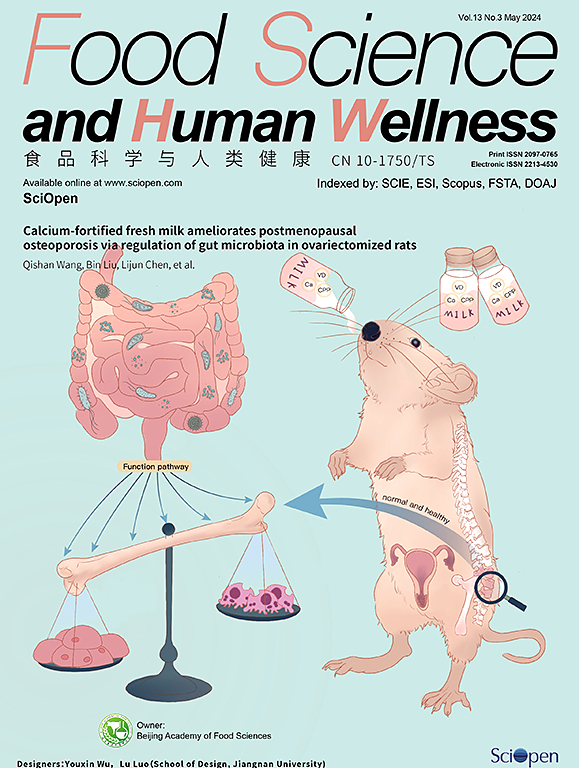Soy polysaccharide maintains colonic homeostasis to protect from dextran sulphate sodium-induced colitis by modulating gut microbiota and intestinal epithelial regeneration
IF 7.4
1区 农林科学
Q1 FOOD SCIENCE & TECHNOLOGY
引用次数: 0
Abstract
Soy polysaccharide (SP) has been reported to possess the properties of modulating gut microbiome diversity. Here, we aimed to explore the protective effects of SP against dextran sulphate sodium (DSS)-induced colitis. Pre-treatment with SP at a dosage of 400 mg/kg·day alleviated colitis symptoms, preventing the weight loss and colon shorten. SP suppressed DSS-induced inflammatory response and enhanced M1 to M2 macrophage polarization. Further investigation showed that SP significantly promoted the regeneration of crypt and the expansion of goblet cell production. In addition, bacterial 16S rRNA sequencing analysis showed that SP modulated the composition of fecal microbiota, including selectively increasing Lactobacillus relative abundance. Notably, SP treatment enriched the production of Lactobacillus-derived lactic acid, which was sensed by its specific G-protein-coupled receptor 81 (Gpr81)/Wnt3/β-catenin signaling, and promoted the regeneration of intestinal stem cells. Fecal microbiome transplantation demonstrated that intestinal flora partially contributed to the beneficial effects of SP on preventing against colitis. In conclusion, SP exhibited the protective effects against colitis, which could be partly associated with modulating the composition of gut microbiota and enrichment of lactic acid. This study suggests that SP has potential to be developed as nutritional intervention to prevent colitis.
大豆多糖通过调节肠道微生物群和肠上皮再生,维持结肠稳态,防止右旋糖酐硫酸钠诱发结肠炎
大豆多糖(SP)已被报道具有调节肠道微生物多样性的特性。在这里,我们旨在探讨SP对葡聚糖硫酸钠(DSS)诱导的结肠炎的保护作用。预用药剂量为400 mg/kg·d的SP可缓解结肠炎症状,防止体重下降和结肠缩短。SP抑制dss诱导的炎症反应,增强巨噬细胞M1 - M2极化。进一步研究表明,SP显著促进了隐窝细胞的再生和杯状细胞的扩增。此外,细菌16S rRNA测序分析表明,SP调节了粪便微生物群的组成,包括选择性地增加乳酸杆菌的相对丰度。值得注意的是,SP处理丰富了乳酸菌源性乳酸的产生,这是通过其特异性g蛋白偶联受体81 (Gpr81)/Wnt3/β-catenin信号传导来感知的,并促进了肠道干细胞的再生。粪便微生物组移植表明,肠道菌群部分参与了SP预防结肠炎的有益作用。综上所述,SP对结肠炎具有保护作用,可能与调节肠道菌群组成和乳酸富集有关。本研究提示SP有潜力作为预防结肠炎的营养干预措施。
本文章由计算机程序翻译,如有差异,请以英文原文为准。
求助全文
约1分钟内获得全文
求助全文
来源期刊

Food Science and Human Wellness
Agricultural and Biological Sciences-Food Science
CiteScore
8.30
自引率
5.70%
发文量
80
审稿时长
28 days
期刊介绍:
Food Science and Human Wellness is an international peer-reviewed journal that provides a forum for the dissemination of the latest scientific results in food science, nutriology, immunology and cross-field research. Articles must present information that is novel, has high impact and interest, and is of high scientific quality. By their effort, it has been developed to promote the public awareness on diet, advocate healthy diet, reduce the harm caused by unreasonable dietary habit, and directs healthy food development for food industrial producers.
 求助内容:
求助内容: 应助结果提醒方式:
应助结果提醒方式:


